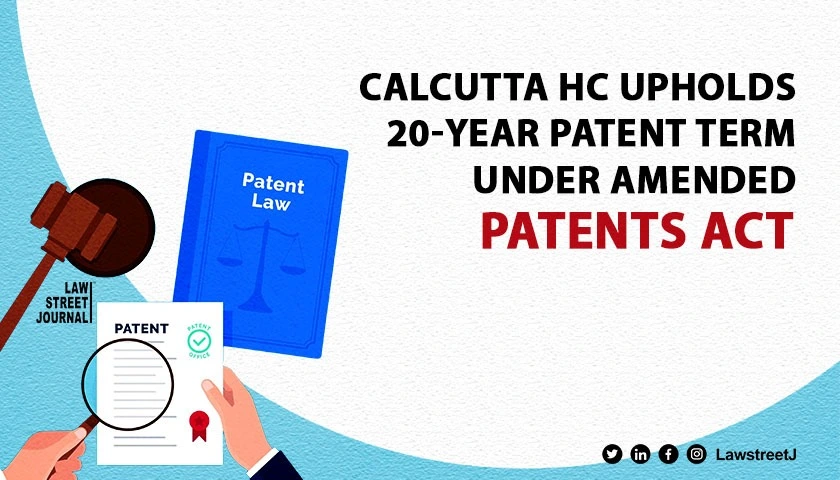NewDelhi: The Calcutta High Court has recently upheld the constitutional validity of amended Section 53 of the Patents Act.
Section 53 of the Act deals with the term of a patent, specifying that the term shall be 20 years from the date of filing the patent application.
While upholding the vires of Section 53, the court held that a patent is not a fundamental right guaranteed by the Constitution of India but a statutory right conferred by legislation. Therefore, the Legislature, in its wisdom, can selectively confer certain rights at different points in time, at various stages of the patent granting process.
It is to be noted that although Article 33 uses the expression 'shall not end before,' leaving it open for the tenure to be twenty years or more, the Indian Parliament, in its wisdom, has chosen to strictly apply the said Article by fixing the term of the patent to a period of twenty years from filing.
Such implementation is perfectly within the legislative competence of the Parliament and in consonance with the TRIPS Agreement as well.
Thus, there is no scope of interference by the Courts on such a count, the court said while referring to the TRIPS Agreement.
The court also held that in the domain of legislation, the wisdom of the Parliament has primacy and cannot be substituted by the courts perception.
FACTS:
The petitioner challenged the constitutional validity of Section 53 of the Patents Act, which deals with the term of a patent and specifies that the term shall be 20 years from the date of filing the patent application.
The primary ground of challenge was that, according to Section 53(1), the term of every patent granted after the commencement of the Patents (Amendment) Act, 2002, and the term of every patent which has not expired and has not ceased to have effect on the date of such commencement, shall be twenty years from the date of filing the application for the patent.
ARGUMENTS:
The petitioner, appearing in person, argued that the full rights conferred by a patent commence only after the grant, and certain limited rights are conferred on the date of publication. He further argued that the stipulation in Section 53, that the term of the patent commences from the date of application, is inherently contradictory to the rest of the statute.
He also argued that the lack of rights until publication and limited patent rights until granted under Section 11A(7) make the calculation of the patent term from the date of filing under Section 53 unreasonable and contradictory to the scheme of the statute.
The petitioner contended that, since the said interregnum was not of any practical benefit to the patentee, the twenty years tenure of a patent should commence from the date of its grant, or at least its publication.
However, the counsel for the respondents argued that Sections 11-A and 53 of the Patents Act are independent of each other and that there cannot be any comparison between the two, as Section 53 comes into play after the right of an applicant is crystallized, whereas Section 11-A(7) operates in the interregnum before the patent is granted. Thus, the two operate at different stages.
They further argued that Section 11-A was introduced subsequently in terms of the TRIPS Agreement, which imposes an international obligation on India, as a signatory, to make its laws compliant with international laws.
Additionally, they argued that the stipulation of the period of twenty years from the date of commencement falls within the legislative domain of Parliament.
DECISION:
After hearing both parties, the court held that Section 53 of the Patents Act, 1970, as amended in 2002, is not mutually exclusive or inherently contradictory with Section 11-A of the Act.
The court outlined that there are three stages to the grant of patent rights:
Patent filing to publication no rights subsist except the right to claim priority over subsequent applications;
Publication to patent grant pursuant to Section 11-A(7), the applicant enjoys similar rights and privileges as a patentee except for the right to institute any proceedings for infringement; and
Grant of the patent the patentee enjoys full rights and privileges as conferred under the Patents Act, 1970, including the right to sue for infringement.
The court held that this gradation was intended by Parliament, and since there is no patent arbitrariness in the same, it cannot be interfered with in judicial review.
In conclusion, the court observed that there is no contradiction between Sections 45 and 53, as both operate in consonance with each other.
Accordingly, the court dismissed the petition, holding that Section 53 of the Patents Act, 1970, is intra vires to the Constitution.





![Calcutta High Court judge directs Supreme Court's Secy Gen to produce transcripts of his interview [Read Order]](/secure/uploads/2023/04/lj_1579_7e4dbb08-78fb-4ca1-9c70-c7173a6c80a9.jpg)
![Calcutta High Court to Examine Plea for Free and Fair Panchayat Polls in West Bengal [Read Petition]](/secure/uploads/2023/06/lj_4382_3e5171bc-a688-49d1-831d-1bbe4f327d07.jpg)






